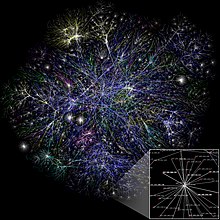The Moon Is a Harsh Mistress
(Redirected from Moon Is a Harsh Mistress)

The Moon is a Harsh Mistress (1966) is a science fiction novel by Robert A. Heinlein about a lunar colony's revolt against rule from Earth. The novel expresses and discusses libertarian ideals.
Quotes[edit]


- Further citation by chapter is desirable





- When Mike was installed in Luna, he was pure thinkum, a flexible logic — "High-Optional, Logical, Multi-Evaluating Supervisor, Mark IV, Mod. L" — a HOLMES FOUR. He computed ballistics for pilotless freighters and controlled their catapult. This kept him busy less than one percent of time and Luna Authority never believed in idle hands. They kept hooking hardware into him — decision-action boxes to let him boss other computers, bank on bank of additional memories, more banks of associational neural nets, another tubful of twelve-digit random numbers, a greatly augmented temporary memory. Human brain has around ten-to-the-tenth neurons. By third year Mike had better than one and a half times that number of neuristors.
And woke up.- Ch. 1
- I spent time then soothing Mike down trying to make him happy, having figured out what troubled him — thing that makes puppies cry and causes people to suicide: loneliness. I don't know how a long a year is to a machine that thinks a million times faster than I do. But must be too long.
- Ch. 1
- That we were slaves I had known all my life — and nothing could be done about it. True, we weren't bought and sold — but as long as Authority held monopoly over what we had to have and what we could sell to buy it, we were slaves.
- Ch. 2
- As it says in Bible, God fights on side of heaviest artillery.
- Ch. 2, Manuel Davis
- (Correction — are no homely women. Some more beautiful than others.)
- Ch. 3
- Genius is where you find it.
- I'm a Fifth Internationalist, most of the Organization is. Oh, we don't rule out anyone going our way; it's a united front. We have Communists and Fourths and Ruddyites and Societians and Single-Taxers and you name it. But I'm no Marxist; we Fifths have a practical program. Private where private belongs, public where it's needed, and an admission that circumstances alter cases. Nothing doctrinaire.
- A rational anarchist believes that concepts such as "state" and "society" and "government" have no existence save as physically exemplified in the acts of self-responsible individuals. He believes that it is impossible to shift blame, share blame, distribute blame. . . as blame, guilt, responsibility are matters taking place inside human beings singly and nowhere else. But being rational, he knows that not all individuals hold his evaluations, so he tries to live perfectly in an imperfect world. . . aware that his effort will be less than perfect yet undismayed by self-knowledge of self-failure.
- Do this. Don't do that. Stay back in line. Where's tax receipt? Fill out form. Let's see license. Submit six copies. Exit only. No left turn. No right turn. Queue up and pay fine. Take back and get stamped. Drop dead — but first get permit.
- Revolution is an art that I pursue rather than a goal I expect to achieve. Nor is this a source of dismay; a lost cause can be as spiritually satisfying as a victory.
- I will accept any rules that you feel necessary to your freedom. I am free, no matter what rules surround me. If I find them tolerable, I tolerate them; if I find them too obnoxious, I break them. I am free because I know that I alone am morally responsible for everything I do.
- Ch. 6
- "Sovereign," like "love," means anything you want it to mean; it's a word in dictionary between "sober" and "sozzled."
- TANSTAAFL
- Acronym created by Heinlein for "There Ain't No Such Thing As A Free Lunch"; Heinlein and Milton Friedman are sometimes credited with creating this phrase, but it existed well before either's use of it, dating to at least the 1930s.
- One way or other, what you get, you pay for.
- This air isn't free, you pay for every breath.
- Thing that got me was not her list of things she hated, since she was obviously crazy as a Cyborg, but fact that always somebody agreed with her prohibitions. Must be a yearning deep in human heart to stop other people from doing as they please. Rules, laws — always for other fellow. A murky part of us, something we had before we came down out of trees, and failed to shuck when we stood up. Because not one of those people said: "Please pass this so that I won't be able to do something I know I should stop." Nyet, tovarishchee, was always something they hated to see neighbors doing. Stop them "for their own good" — not because speaker claimed to be harmed by it.
- As an electronics man I shuddered. Throw away every book, table, instrument, and start over? I know that some of my ancestors did that in switching from old English units to MKS--but they did it to make things easier. Fourteen inches to a foot and some odd number of feet to a mile. Ounces and pounds. Oh, Bog! · Ch 14
- First, what is it you want us to pay taxes for? Tell me what I get and perhaps I'll buy it.
- In past history popularly elected governments have been no better and sometimes far worse than overt tyrannies.
- Suppose instead of election a man were qualified for office by petition signed by four thousand citizens. He would then represent those four thousand affirmatively, with no disgruntled minority, for what would have been a minority in a territorial constituency would all be free to start other petitions or join in them. All would then be represented by men of their choice. Or a man with eight thousand supporters might have two votes in this body. Difficulties, objections, practical points to be worked out — many of them! But you could work them out. . . and thereby avoid the chronic sickness of representative government, the disgruntled minority which feels — correctly! — that it has been disenfranchised.
- Ch. 22
- Whatever you do, do not let the past be a straitjacket!
- Comrades, I beg of you — do not resort to compulsory taxation. There is no worse tyranny than to force a man to pay for what he does not want merely because you think it would be good for him.
- You have put your finger on the dilemma of all government — and the reason I am an anarchist. The power to tax, once conceded, has no limits; it contains until it destroys. I was not joking when I told them to dig into their own pouches. It may not be possible to do away with government — sometimes I think that government is an inescapable disease of human beings. But it may be possible to keep it small and starved and inoffensive — and can you think of a better way than by requiring the governors themselves to pay the costs of their antisocial hobby?
- I note one proposal to make this Congress a two-house body. Excellent — the more impediments to legislation the better. But, instead of following tradition, I suggest one house of legislators, another whose single duty is to repeal laws. Let the legislators pass laws only with a two-thirds majority... while the repealers are able to cancel any law through a mere one-third minority. Preposterous? Think about it. If a bill is so poor that it cannot command two-thirds of your consents, is it not likely that it would make a poor law? And if a law is disliked by as many as one-third is it not likely that you would be better off without it?
- Ch. 22
- In writing your constitution let me invite attention to the wonderful virtue of the negative! Accentuate the negative! Let your document be studded with things the government is forever forbidden to do. No conscript armies... no interference however slight with freedom of press, or speech, or travel, or assembly, or of religion, or of instruction, or communication, or occupation... no involuntary taxation.
- What I fear most are affirmative actions of sober and well-intentioned men, granting to government powers to do something that appears to need doing.
- Seems to be a deep instinct in human beings for making everything compulsory that isn't forbidden.
- Oratory is a null program.
- Some logics get nervous breakdowns. Overloaded phone system behaves like frightened child. Mike did not have upsets, acquired sense of humor instead. Low one. If he were a man, you wouldn't dare stoop over. His idea of thigh-slapper would be to dump you out of bed — or put itch powder in pressure suit.
- Excuse me, I did not mean to criticize your planet.
- Women are scarce; aren't enough to go around — that makes them most valuable thing in Luna, more precious than ice or air, as men without women don't care whether they stay alive or not.
- At one time kings were anointed by Deity, so the problem was to see to it that Deity chose the right candidate. In this age the myth is "the will of the people" ... but the problem changes only superficially.
- You listening, Bog? Is a computer one of Your creatures?
- But I was born free.
